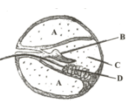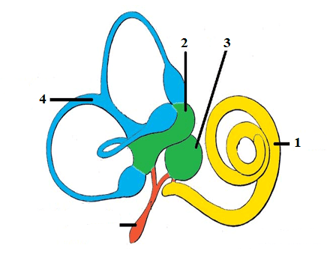EASY
Earn 100
Fenestra ovalis is the opening of -
(a)Cranium
(b)Tympanum
(c)Tympanic cavity
(d)Brain
50% studentsanswered this correctly
Important Questions on Neural Control and Coordination
EASY
Which of the following statements is correct?
MEDIUM
A gymnast is able to balance his body upside down even in the total darkness because of:
HARD
Which of the following statement is correct?
(i) The rods contain a purplish-red protein called the rhodopsin.
(ii) The photopigments are embedded in the membrane discs of the inner segment.
(iii) Retinal is a derivative of vitamin A.
(iv) Light induces dissociation of the retinal from opsin resulting in changes in the structure of the opsin.
EASY
In a blind spot of the human eye
EASY
Write any two diseases/defects of the ear.
MEDIUM
Match the following columns and select the correct option:-
| Column | column | ||
| (a) | Rods and cones | (i) | Absence of photoreceptor cells |
| (b) | Blind spot | (ii) | Cones are densely packed |
| (c) | Fovea | (iii) | Photoreceptor cells |
| (d) | Iris | (iv) | Visible coloured portion of the eye |
HARD
Choose the correct statements.
EASY
The transparent lens in the human eye is held in its place by
MEDIUM
The auditory nerve gets its input from which of the following?
EASY
The photosensitive compound in the human eye is made up of:
EASY
When one goes from a brightly lit area to a dimly lit room our eyes adjusts slowly, thereby regaining the clarity of vision. Which ONE of the following explains this process?
MEDIUM
Draw a labelled diagram of the internal ear and explain the mechanism of hearing.
MEDIUM
Observe the given steps related to the experience of taste and arrange them properly.
- Impulses reach the brain through the nerves.
- The taste detecting chemoreceptors are stimulated.
- The substances reach the taste buds through saliva.
- Substances responsible for taste dissolves in saliva.
- Forms the experience of taste.
- Impulses form in the chemical receptors.
MEDIUM
Which one of the following statements is not correct?
MEDIUM
Scientists find a gene that helps human peripheral neurons to sense temperature less than and induce a physiological signal of avoidance. This gene is present in almost all vertebrates. Considering that gene has role only in detection of low temperature, the correct statement(s) is(are)
EASY
In the mammalian eye, the 'fovea' is the the center of the visual field, where:
EASY
In mammals, quadrate is modified as
MEDIUM
Match the following columns and select the correct option.
| Column-I | Column-II | ||
| (a) | Organ of Corti | (i) | Connects middle ear and pharynx |
| (b) | Cochlea | (ii) | Coiled part of the labyrinth |
| (c) | Eustachian tube | (iii) | Attached to the oval window |
| (d) | Stapes | (iv) | Located on the basilar membrane |
MEDIUM
A diagrammatic cross section of a single loop of human cochlea is shown in the given figure.

Which one of the following options correctly represents the names of any three of the labelled parts?
MEDIUM
The given diagram shows a certain part of a mammalian ear:

(i) Label the parts indicated by guidelines, .
(ii) Which part of the ear is represented?
(iii) Which of the labelled parts (give number only) is concerned with balance and equilibrium?
(iv) Name two main types of ear defects.

